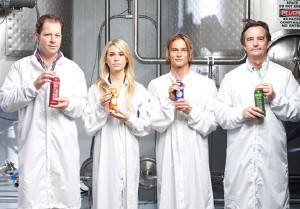When I was a little girl, my dad would call my twin sister and me “double trouble.” She and I both were constantly doing things together, especially bad things. I believe many other parents with twins can attest to that title being very accurate for the same reason too. I’m sure the parents of twin boys Ryan and Adam Goldston felt the same way.
I cannot attest to how well behaved they were as children, but both Ryan and Adam as young entrepreneurs seemed to cause some trouble. As mere 28 year olds, they had already created a product that had been banned from the NBA. As you can imagine, that created some interest in their company. So much interest that they sold out of nine months of inventory just 72 hours after their banning was announced.
I guess, you have to ask what an entrepreneur has to do to get his product banned from part of the sports industry. The answer to that would be to design the first pair of sneakers that allows you to jump higher and run faster. They call it “Load ‘N Launch,” and it is the first patented technology of its kind.
This duo got their idea from sports they had played all throughout high school and college. Once they graduated they started tinkering with the possibility of a shoe that could help the user. Eventually, they came up with this technology and the name of their company, Athletic Propulsion Labs or APL. These fancy shoes come in all kinds of colors, styles, and modifications for specific purposes. APL recently launched a clothing line too.
Ryan and Adam, partnered with each other to revolutionize the old industry of sneakers. They bring a new youthful fun flare to what appears to be a stagnant marketplace. It seems to me that they are a force to be reckoned with and already are becoming successful.

For more information, visit the site below
http://www.athleticpropulsionlabs.com/







 his father’s advice when an oncoming truck forced Wimmer to jump into a ditch to avoid being hit during a training run. After graduating, Wimmer and his father, an entrepreneur, holed up in their basement, and using credit cards to back their endeavors, began producing athlete-friendly ID tags, modeled after military dog tags. The two of them called their upstart Erlanger, Kentucky based company Road ID. Now, thirteen years later, the company continues to make these athletic ID tags and will engrave them with anything the customer chooses, but still recommends including “vital statistics and inspirational mantras to help lift spirits mid-workout.” An interactive version of these tags also gives responders access to your medical information including allergies and health insurance in the case of an emergency. However safety’nuts are not the only people who have taken an interest in these ID bands. What started out as a practical way to protect athletes has now evolved into a status symbol- a fashion statement that says: “I’m an athlete.”
his father’s advice when an oncoming truck forced Wimmer to jump into a ditch to avoid being hit during a training run. After graduating, Wimmer and his father, an entrepreneur, holed up in their basement, and using credit cards to back their endeavors, began producing athlete-friendly ID tags, modeled after military dog tags. The two of them called their upstart Erlanger, Kentucky based company Road ID. Now, thirteen years later, the company continues to make these athletic ID tags and will engrave them with anything the customer chooses, but still recommends including “vital statistics and inspirational mantras to help lift spirits mid-workout.” An interactive version of these tags also gives responders access to your medical information including allergies and health insurance in the case of an emergency. However safety’nuts are not the only people who have taken an interest in these ID bands. What started out as a practical way to protect athletes has now evolved into a status symbol- a fashion statement that says: “I’m an athlete.”  Runners, cyclists, and many other athletes are now wearing their Road ID’s even when they are not working out. In 2011 the previously online retailer decided to broaden its horizons by using kiosks to market and sell their bands in sporting goods shops. In addition to this, the company deals heavily in social media and email advertising as well as word of mouth. When a customer buys any Road ID product, they receive a special discount code that they can use and share for 30 days to get deals on other Road ID goods. In this way Road ID makes its customers its prime salesmen. Although Wimmer refuses to divulge the company’s current worth, he claims that the company has growth by about 50% every year since 2002 and expects that its growth will continue as more and more athletes become acquainted with their product and want the image that it provides.
Runners, cyclists, and many other athletes are now wearing their Road ID’s even when they are not working out. In 2011 the previously online retailer decided to broaden its horizons by using kiosks to market and sell their bands in sporting goods shops. In addition to this, the company deals heavily in social media and email advertising as well as word of mouth. When a customer buys any Road ID product, they receive a special discount code that they can use and share for 30 days to get deals on other Road ID goods. In this way Road ID makes its customers its prime salesmen. Although Wimmer refuses to divulge the company’s current worth, he claims that the company has growth by about 50% every year since 2002 and expects that its growth will continue as more and more athletes become acquainted with their product and want the image that it provides. Julia Hu is doing something dozens of others are doing. But she is doing it right and she is doing it better. Hu created a wristband called LarkLife that tracks sleep patterns, diet, and exercise. Millions of people attempt to log their food intake and fitness for the day through phone apps and website, but have trouble keeping up. This is not the only issue – Hu and her 21 employees at Lark Technology believe that people are not challenged to change their life simply with raw data. “When you look at everyone in the world, about 3 to 4 percent are motivated by data. These are Olympic athletes, highly goal-oriented people, and tinkerers,” Hu explains. “The rest of the population is not at all motivated by numbers–or is actually negatively motivated by seeing numbers.”
Julia Hu is doing something dozens of others are doing. But she is doing it right and she is doing it better. Hu created a wristband called LarkLife that tracks sleep patterns, diet, and exercise. Millions of people attempt to log their food intake and fitness for the day through phone apps and website, but have trouble keeping up. This is not the only issue – Hu and her 21 employees at Lark Technology believe that people are not challenged to change their life simply with raw data. “When you look at everyone in the world, about 3 to 4 percent are motivated by data. These are Olympic athletes, highly goal-oriented people, and tinkerers,” Hu explains. “The rest of the population is not at all motivated by numbers–or is actually negatively motivated by seeing numbers.”